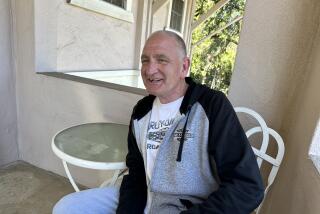Mental Exam May Block Rapist’s Parole in Covina : Prisons: State increasingly uses last-minute tests in effort to bypass sentencing law. Political climate is a factor.
Serial rapist Reginald Donald Muldrew has a crucial test coming.
On Dec. 4, Muldrew--who is suspected in more than 200 sexual attacks--is scheduled for parole in Covina after spending the last 15 years in custody.
But on the day he walks out of Pelican Bay State Prison in Northern California, he must pass a psychiatric exam. If he fails, he goes back behind bars for up to a year of psychiatric treatment.
Nothing in the law requires the test. But in this year’s charged political climate, state officials have begun administering day-of-release psychiatric exams to high-profile rapists. The tactic is a sometimes desperate attempt to circumvent the state’s 1977 determinate sentencing law, which requires specific release dates.
Since March, five high-profile sexual offenders--all scheduled to be paroled in Southern California--have had their paroles revoked after failing eleventh-hour psychiatric exams.
Although attorneys representing convicts condemn this “psychiatric return” tactic as a violation of their clients’ rights, corrections officials call it a last line of defense. The determinate sentencing law--passed by the Legislature to take away judges’ discretion to impose lenient sentences--also had the effect of taking away the authority of the parole board to keep dangerous rapists off the streets. The average sex offender in California spends less than 3 1/2 years in prison, corrections officials say.
“When you’re releasing people who . . . are going to kill people . . . you have no recourse or (immediate) way to retain them unless it’s under this guise” of psychiatric return, said Jerome DiMaggio, regional parole administrator for northern Los Angeles County.
Like other prisoners, convicted rapists serve a set time, with days off for good behavior and work credits, and are paroled automatically unless a state psychologist or psychiatrist steps in.
Covina is the latest battleground. On Monday night more than 3,000 Covina-area residents protested the scheduled parole of Muldrew, 46, who was convicted on six counts of sexual assault in Los Angeles during the 1970s. Police Chief John Lentz, who said state officials have notified him that Muldrew is to be paroled in Covina, urged residents to register their protests with Gov. Pete Wilson.
The controversy follows other day-of-release psychiatric exams administered to:
* Christopher Hubbart, 43, a rapist who was scheduled for release to his parents’ home in Claremont in March. In and out of prison since 1973, Hubbart has been linked to nearly three dozen rapes.
* Robert Keith Donelson, 48, a child molester who was scheduled for release in an unspecified Orange County city in April. He boasted of molesting more than 150 children.
* Joe Caro Jr., 74, a child molester who was scheduled for release in Downey in July. He was to move into a motel within walking distance of two preschools and a junior high school.
* David Stanley Lee, 45, a rapist and multiple felon who was scheduled for release in San Bernardino in July. He told a prison psychiatrist that he would go on a “killing spree” when paroled. In Lee’s case, corrections officials went one step further by scheduling his psychiatric exam while he was in prison, rather than waiting for his release date.
* Donald Bartsma, 26, a rapist who was scheduled for release in Lancaster in April. Bartsma told a prison psychiatrist that he had dreams of raping and murdering women.
Attorney Steven Fama of the Prison Law Office, an inmates rights nonprofit group in San Rafael and co-counsel on a state Supreme Court case challenging the psychiatric return procedure, said prisoners have become pawns in a process in which rapists “become a potential embarrassment to the people running for governor, and get . . . thrown (back in prison)” as a result.
Steve Goya, a deputy regional parole administrator, denied that the system had been manipulated in Muldrew’s case or the other five. Parole officials weigh each case individually, based on the nature and frequency of the offense, and the perceived danger to the public, he said.
“I think you’re inferring that there’s some sort of pattern, that we’re using this as a ploy to get people to stay in prison. That’s not true,” Goya said. “On each individual case, they appear to warrant (the psychiatric exam). Should we stop doing evaluations because it looks bad? No.”
In 1993, 228 of 90,268 parolees--a minuscule 0.25%--qualified for psychiatric return to prison. Corrections officials do not know how many of those parolees got their psychiatric exams on the day of their release. But in each of the state’s four parole regions, administrators could cite only a few if any last-minute psychiatric tests.
Parole administrators began ordering the exams after rediscovering a little-known state code that allows psychiatric testing of parolees. The code does not specify when parole administrators can order the psychiatric evaluations.
In the past, officials usually gave parolees a few weeks or months of freedom before authorizing an evaluation. In fact, the code requires the evaluator to consider the “parolee’s adjustment” and “ability to maintain himself or herself in the community”--hardly qualities that can be measured when someone has only a few hours of freedom and is never outside the custody of parole agents.
The issue of freed rapists riveted public attention in March, when Wilson came under heavy fire for paroling serial rapist Melvin A. Carter to a prison work camp just outside the town of Alturas in the northeast corner of California. Carter, who had admitted raping more than 100 women, was paroled March 17 after serving half of his 25-year sentence.
The next day, the media spotlight turned south to Claremont, where Hubbart was supposed to go home to his 64-year-old mother and 75-year-old stepfather.
In Claremont, a historic college town with no drive-ins or bars, where the annual Fourth of July Parade includes a thumb-twiddlers team and lawn mower brigade, a fierce protest materialized overnight. Demonstrators waved signs outside Hubbart’s parents’ house such as “Kill the Rapist” and “Lorena Bobbitt, Where Are You?”
Despite several evaluations over the previous year that found little justification to hold Hubbart, it took one evaluation to keep Hubbart off the streets--the one on his scheduled parole date.
Parolees who fail such an exam go back to prison for up to a year of psychiatric treatment--even if the results contradict their previous prison evaluations. In Hubbart’s case, two evaluators diagnosed a mental disorder, while three others said he had none.
Criminal law professor Robert Pugsley of Southwestern University in Los Angeles said that because “psychiatry is an art, not a science,” doctors “should not be brought in at the eleventh hour to provide a veil of justification to keep a person in prison because the community is in an uproar.”
Patricia Occhiuzzo Giggans, executive director of the Los Angeles Commission on Assaults Against Women, argues that a psychiatric exam should not even be necessary to keep Hubbart off the streets. “(Freeing) somebody who has committed over 30 rapes with no prospects for rehabilitation?” she asked. “This is not brain surgery. This is common sense.”
Hubbart’s case was the first in recent memory to trigger a day of release psychiatric exam, corrections officials said.
At 5 a.m. on the day of his scheduled release, parole officers picked him up at the prison in Chino and drove to the Pomona parole office. A psychiatrist evaluated him immediately.
Art Lucero, a deputy regional parole administrator, said the public pressure had nothing to do with Hubbart’s psychiatric exam. Lucero said the exam had been scheduled at least a week ahead of Hubbart’s scheduled parole and before a local newspaper broke the story of his potential release.
“When the fact came up that this guy has a really bizarre background . . . (we asked): ‘Are we sure this guy really does have it together?’ This guy’s extremely dangerous,” Lucero said. “We hadn’t done (last-minute exams) in the past probably . . . because we hadn’t thought about it. . . . We’re breaking new ground.”
A month after Hubbart’s near-release, Bartsma’s scheduled parole provoked a community furor in Lancaster. Bartsma also took--and failed--a psychiatric exam on the day of his release.
The decision to order Bartsma’s psychiatric evaluation was inspired partly by the public outcry over Hubbart’s near-release and the parole of serial rapist Carter, said Rosario Santillan, supervisor of the Antelope Valley state parole office.
“We had a high-profile case that went to (the Bay Area) that the public was unhappy about. We had the (Hubbart) case down south. We learned from those things. (The psychiatric examination) was a tool that we had in our hands, so (we thought) let’s do it.”
Hubbart’s lawyer, Rowan K. Klein, has filed a writ with the California Supreme Court, challenging the constitutionality of his client’s parole revocation and contending that the publicity prompted the Corrections Department to take extraordinary measures in the case.
The public furor over felons on parole increased late last year with the arrest of parolee Richard Allen Davis in the kidnaping and murder of 12-year-old Polly Klaas of Petaluma. In September, Wilson signed the toughest rape law in the nation, the “one strike” bill, which requires up to life in prison for first-time violent sex offenders.
Each month, the state’s prisons release 250 rapists, child molesters and other sex offenders, most of whom the public never hears about. But this year was different, Department of Corrections spokesman Bill Gengler said.
“A year ago, (a rapist) would have gone to (a city), moved into a house, his mother’s house, or a relative or friend, or set up housekeeping himself, and we would have not heard of it. . . . I think there’s a heightened awareness because of the media. This is an election year.”
Times staff writer Joe Donnelly contributed to this story.
More to Read
Sign up for Essential California
The most important California stories and recommendations in your inbox every morning.
You may occasionally receive promotional content from the Los Angeles Times.










